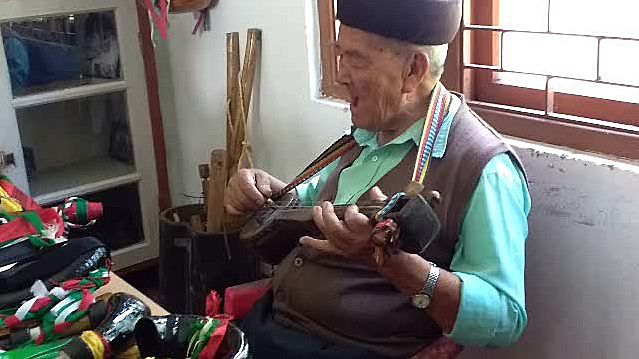A group of seven friends have formed a band in Sikkim in order to preserve the Lepcha language and to help popularize traditional Lepcha folk music, both of which are endangered. A news story in the magazine Eclectic Northeast last week described the progress, and setbacks, of the Lepcha folk-fusion band Sofiyum.

The founder of the band and the lead vocalist, Micma Tsh Lepcha, explained to the journalist, Mrinal Paul, that “Sofiyum” is the word for “breeze” in Lepcha. He and his friends felt that a good way to revive the traditional culture was to focus on the language as it is used in their folk songs. He said that their music is based on natural sounds since nature forms the basis of their beliefs. Their folk music is preserved orally, he explained, by being passed down through the generations.
It is clear from the article that Micma and the rest of the band want to popularize the folk music as well as just preserve it. Even though there aren’t very many others who are promoting Lepcha music, he feels that it will not be completely forgotten. It fosters a “feeling of identity,” he explained, so some people will probably continue to cherish it, regardless of how often it is played by bands.
The band members use traditional Lepcha instruments in order to further the connections with their cultural heritage, such as a Ranger, which is basically a drum fashioned from a hollow tree trunk; a Puntong, a flute with four holes; and a Tungbuk, which might be compared to a three-stringed mandolin. Other instruments include a Blingthop, a Longthyol, a Po-patek and a Po-Pasong. The origins of the instruments are not known but, as Micma told the Mr. Paul, “they all imitate nature sounds so it is safe to believe that they were derived from it.” Fortunately, a YouTube video is available so it is easy to enjoy the band for over seven minutes.
In addition to Lepcha folk music, Sofiyum band members are inspired by hard rock, blues, and glam music. They formed in 2011 and had their first major gig at a World Music Day festival the next year held at Shillong, a small city in northeastern India. They also performed at the Ziro Festival of Music and Songs and Dances of Northeast in 2016.
Micma said that their music is appreciated by younger listeners, even though most of them don’t speak or understand spoken Lepcha, the language of the songs. He spoke to the journalist proudly of the popularity of their songs with the young people: “I can safely say that we have been able to communicate to the youth and make people aware of the importance of our roots most satisfactorily.” He can be forgiven for bragging. Their growing popularity gives the band members hope for the future preservation of their culture.
The band has had to struggle with such problems as finding good places to practice, difficulties with finances, and inadequate equipment. But they continue in their chosen ways, performing the style of music that they believe in deeply—and that their fans increasingly appreciate. Currently they are focused on producing a full-length album, so they are spending much of their time in their studio. But they fervently believe that preserving the Lepcha culture is worth it.